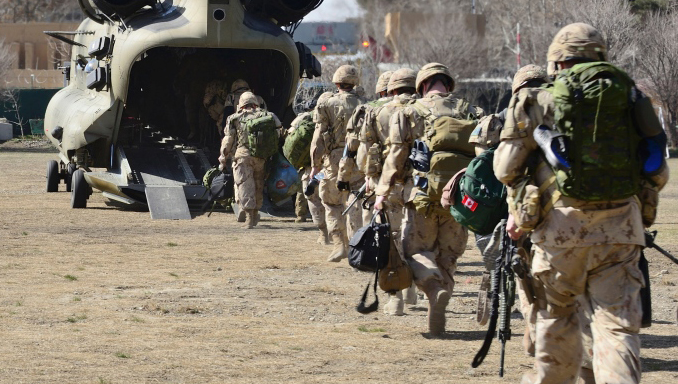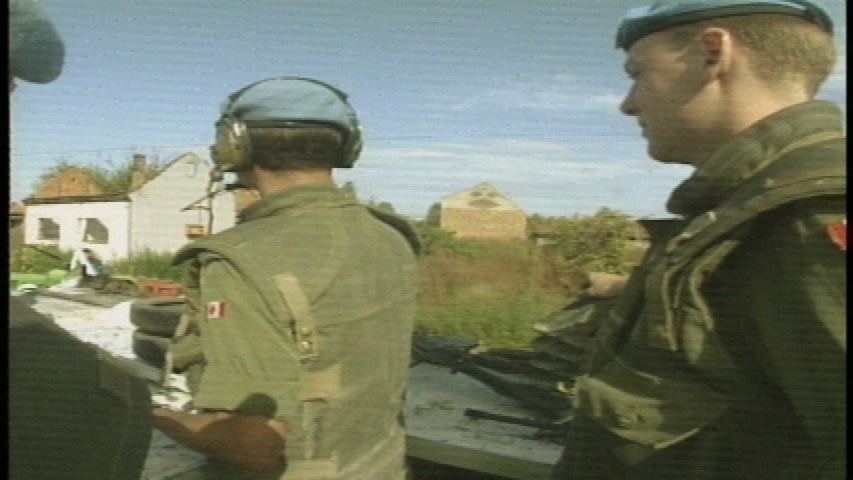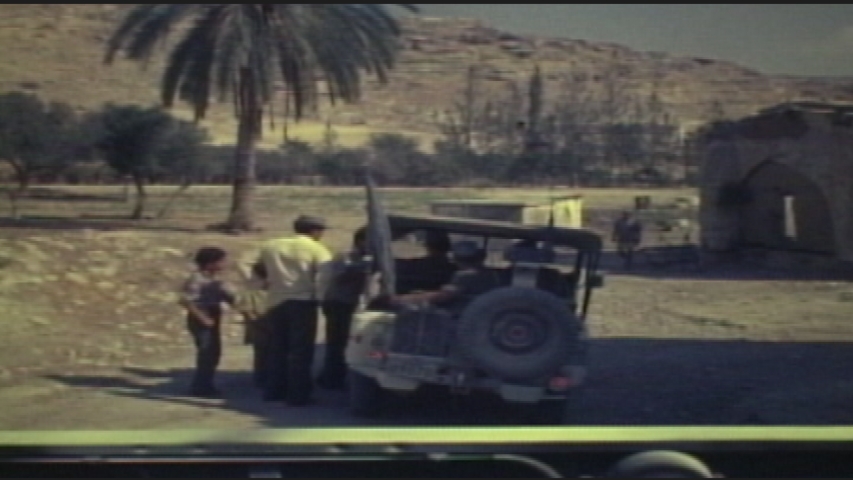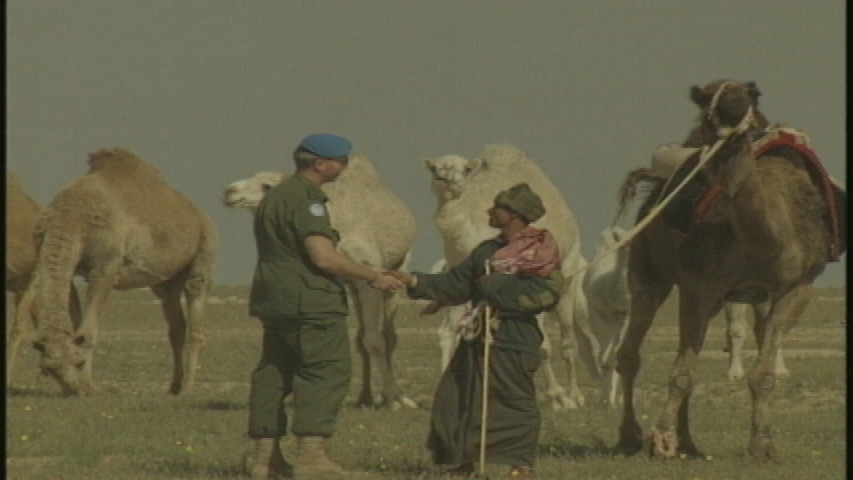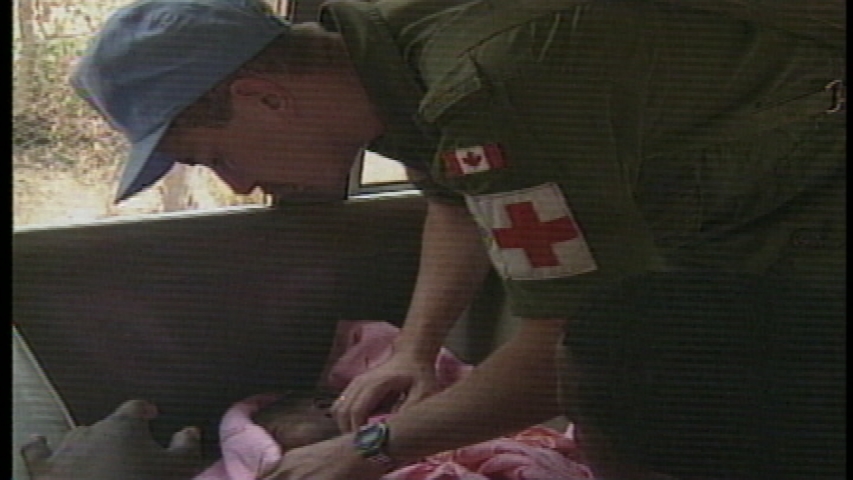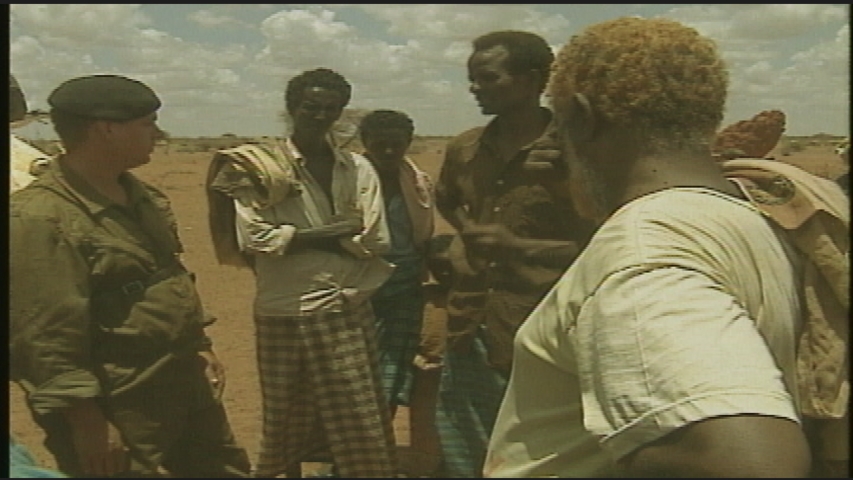Congo - Canadian Armed Forces in Congo
Canadian Armed Forces
Congo - Canadian Armed Forces in Congo
Transcript
Spinning world globe with text "Canadians Forces in The Democratic Republic of the Congo" map of Congo appears on screen
Canadian Forces Veteran Bob Terry
It was an enormous culture shock that we weren’t prepared for and I don’t think anybody was.Canadian Forces Veteran Fred Gallant
To be honest with you, I had no idea of what the Congo wasMilitary personnel looking over a map on the wal
except that I knew it was in Africa.Canadian Forces Veteran Ed Dubinski
You were surrounded by jungle and yet in the city, Léopoldville, at that timeMilitary personnel pointing out places on map of Congo
was probably the largest city in Africa.Aerial view of the city of Leopoldville
Canadian Forces Veteran Ron Knapton
When we flew over Léopoldville, I couldn’t believe it. There's this this beautiful city sitting in a sea of green.Soldiers standing in front of jeep talking to the locals, palm trees and green grass huts in background
First of all, I expected to see a whole bunch of grasshuts, you know,Soldier bending down chatting with your children, grass hut in the background
villages and so on. I had no idea whatCanadian Forces Veteran Fred LBlanc
there’d be there and Léopoldville,Paved highway with tall buildings and modern day landscape
it was like if you saw pictures of in Europe.Beautiful white mansion amongst the trees and paved driveway
I mean they had buildings and houses that were in better shape than what we had, and I said, you know, “What’s this?”Beautiful sights of green landscape and pools of water, locals standing by
But then it changes outsideLocal villagers walking across street, run down houses made of straw and tin roofs, local market square
of the city or Léopoldville, it was different.Outside city limits, locals sit in poverty with wash basins and collection of debis, wood makeshift huts in background used for housing
Two locals picking up wood and sticks from the dry sandy ground
It was just as day and night.Military standing on patrol
You asked somebody there who are you and where are you from,Military personnel looking over paperwork as a local villager looks on
they’d give you their name and then they would tell you the name of their village and then their tribe.Soldier and local villager in discussion
They weren’t Congolose,Locals dressed in tribal uniform speaking with military personnel sitting in jeep
they were Bacongo or Bantu orCongo landscpa of trees, hills and large white buildings in the distance
whatever they were.Local workers in bakery with pile of bagels
They were the servants of the BelgiquesBeautiful home with trees and beautiful surroundings
and they served them well and as long as they did they got a little job,Local Congoleise talking with a soldier
“You cut the lawn, you serve the drinks,Three factory workers cutting meat
you make the meals.” you know,Canadian Forces Veteran Ed Dubinski
and they taught them how to do these things and the Belgiques lived like literally royalty.Group of Congo people in a huddle in front of a metal roofed structure with trees and grassy landscape
The Congo people wanted their independence.Statue in Belgium, people walking by
The country was actually run,Canadian Forces Veteran Fred LeBlanc
it was a colony of Belgium so an agreement came that at a certain date they would take and turn over, give the government, the country to the Congolese and the Belgiques were supposed to stay there for a period, a certain period of time to oversee the operating of the government. When it was given to them, then what happened was that you had warlords that wanted to take over.Canadian Forces Veteran Bert Diamond
The Belgiques took off and left their cars and houses there and the Congolese moved into them.Canadian Forces Veteran James Gratto
You walk into a house and the clothes are still hanging in the closet, a jacket might be still on the back of a chair because all they took was their money or their valuables and left. If not, they would have been hacked to death.Canadian Forces Veteran Ed Dubinski
But the hatred that was in to the heart and that hatred that each has for the other never really disappears.Long line of locals standing by with their bicycles
See we were peacekeepers. You were allowed to carry ammunition butPatrol through the streets, soldiers standing by as trucks and military vehicles are stopped
Soldiers walking through streets carrying weapons
you couldn’t have it in your weapon.Soldier and local worker walk towards the communication control towers
Our job was to take and supply communications. We were armed to protect ourselves.Soldiers on patrol looking over paperwork
Canadian Forces Veteran Bert Diamond
You had to patrol the area overnight and that was dicey at times because you’re out there at three o’clock in the morning in the middle of nowhere, can’t see anything. You’ve got five rounds in a machine gun and you’re not allowed to use it unless your life’s in danger.Canadian Forces Veteran James Gratto
Now, anybody that tells you that, “Don’t worry, no one’s going to bother you because you’re wearing a blue beret.” Okay.Soldiers laying on patrol in middle of hay pile
Local shaking hands with United Nations Officer as truck is backed up to aircraft
Or a blue patch which says UN.UN road patrol in discussion with locals military
To some people that didn't, doesn’t mean a thing, so you have to be careful.Canadian Forces Veteran Bob Terry
You develop instincts that you never knew you had but probably your ancestors a thousand generations ago had. You, you become quite primitive. You go into survival mode.Children and adults accepting aid from military personnel
I’ve seen children and adults fightingCanadian Forces Veteran Fred LeBlanc
for food out of garbage and the thing is, is that adults pushing the kids away unless it was their own child. If it’s their own child, then naturally you survive, well that's what it is, it's a matter of survival.Canadian Forces Veteran James Gratto
I look at it myself and say well, what good did I do there? You know, what was even the sense of even going there in the first place?Two white jeeps full of United Nations military personnel
As we drove our trucks to the airport to leave, we had not won a battle.Canadian Forces Veteran Ed Dubinski
You know,we had, we were still with weapons as we left, you know, so that if we were attacked we could at least fight back. But you think about that after a while, you know, “I wasted my time there.” But did I? I don’t know.Beautiful landscape of trees, grassy fields and huge white buildings in the backgroun
It's a beautiful country that could be a very nice place to live.Canadian Forces Veteran Ed Dubinski
But when I think back at Canada I think, my god, I’m one lucky guy you know to have a place like Canada to live.Description
Collection of interviews with veterans of the Canadian Armed Forces recounting their experience of military service in Congo. The veterans of this video are: Bob Terry, Fred LeBlanc, Ed Dubinsky, Ron Knapton, Bert Diamond and James Gratto.
Meta Data
- Medium:
- Video
- Owner:
- Veterans Affairs Canada
- Recorded:
- February 2, 2010
- Duration:
- 5:15
Related Videos
- Date modified:



